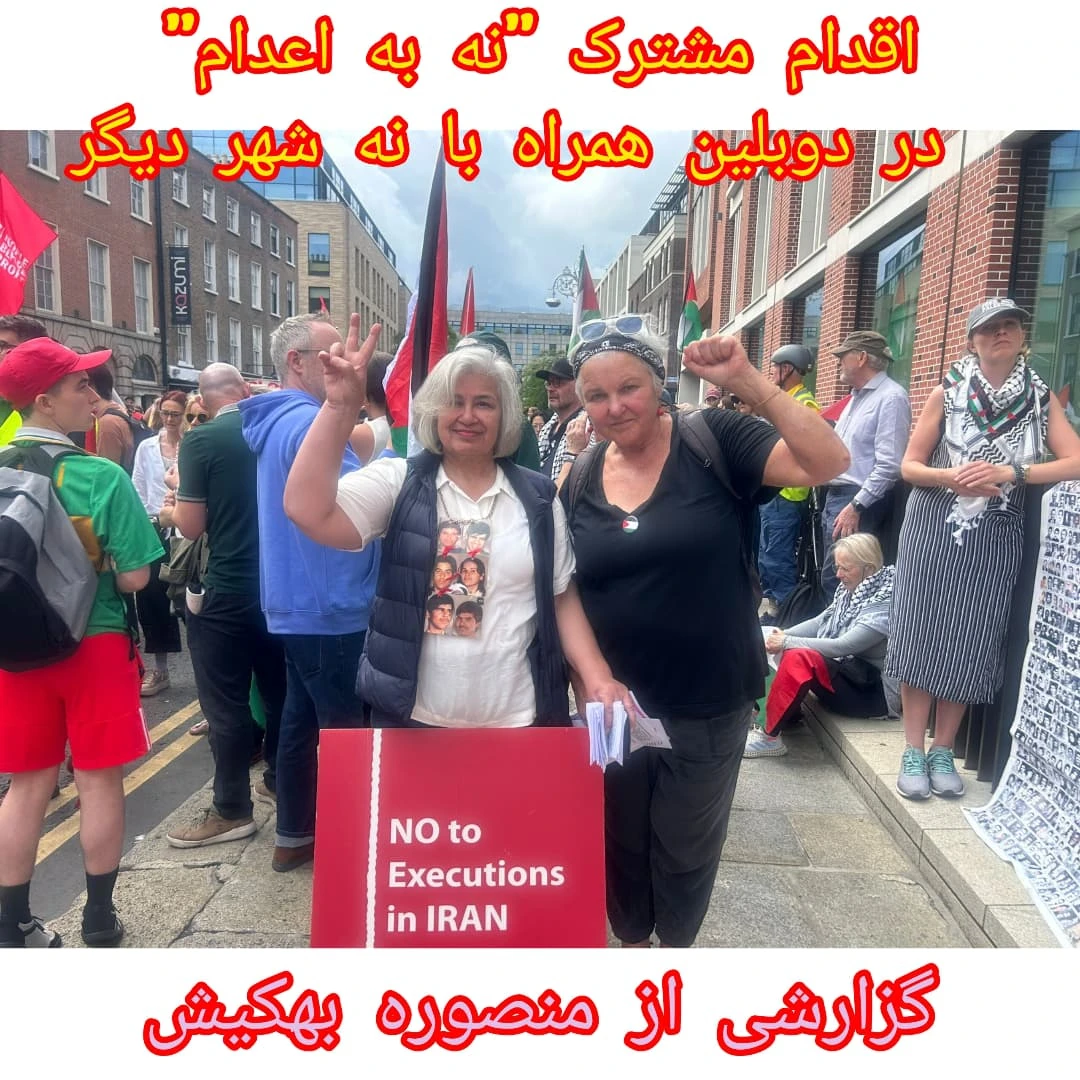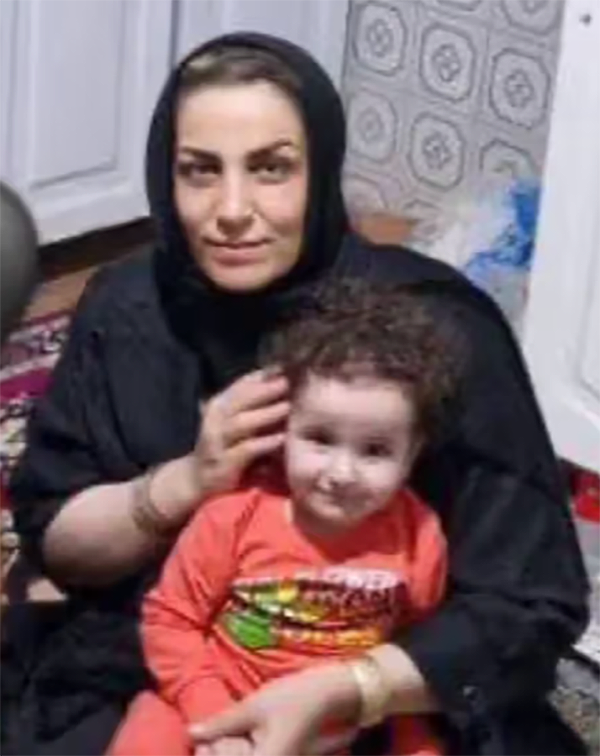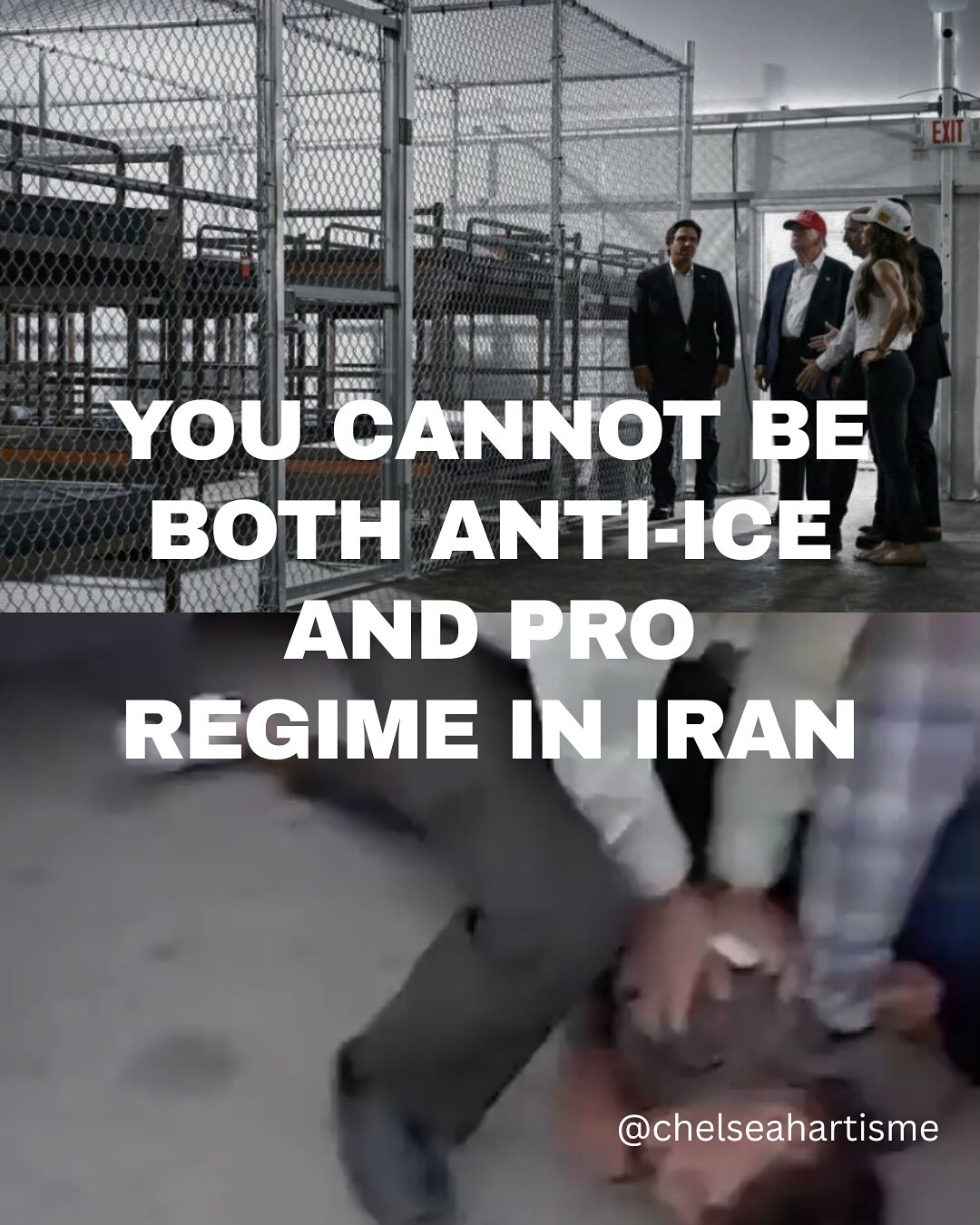July 22 marked the 78th consecutive week of the prisoner-led “No to Execution Tuesdays” hunger strikes, spreading now to 48 prisons across Iran. On July 16, quick action by prisoners prevented authorities from transferring one of the original and steadfast hunger strikers from Ghezel Hesar Prison, where the hunger strike began in early 2024. The attempted transfer of this prisoner, Saeed Masouri, was likely aimed at weakening or breaking the strike that has cohered, persisted and become a mass movement and clarion call for civil society to join in the struggle against the injustice of executions and its use as a means of mass terror.
As reposted by Burn the Cage movement, the attempt to transfer him to a distant prison “was met by protest and resistance from the ward's prisoners. Clashes broke out between the security forces and the prisoners. Ultimately, the prisoner was returned to the prison's general population.” The regime warned that one way or the other, Masouri’s transfer would happen. They posted guards and security agents all around the ward and outside the prison. Masouri is a political prisoner who has been imprisoned without a day of furlough for 25 years. His lawyers filed a lawsuit to prevent the transfer so he is still in Ghezel Hesar Prison as of this writing (7/25). Punishing prisoners through forced transfers is a cruel tactic Iran’s regime frequently employs to make visitation difficult or impossible and to break up prisoner solidarity. Immediately after the attempted transfer, numerous statements against it were issued by both women and men political prisoners in various prisons.
As we go to press, it is reported on July 25 that another political prisoner in Ghezel Hesar, Zartasht Ahmadi Ragheb, was being forcibly transferred into a solitary confinement ward but his fellow prisoners also intervened and prevented it.
Solidarity Actions Around the World
Video caption: July 19 action in Cologne, Germany, against the anti-Afghan policies and the executions by the Islamic Republic regime. Activists in support of the prisoners’ strike, and the Burn The Cage movement, were accompanied by Shekib Mosadeq, the revolutionary Afghan singer,” here performing the “Burn The Cage, Free the Birds” anthem that he composed in 2021.
This determination to stop all executions was amplified by protests in Europe and elsewhere, mainly by Iranians in the diaspora but also other supporters of Iran’s political prisoners, adding an internationalist atmosphere to this crucial struggle.
Last week, a variety of forces held actions in support of the ongoing prison-based protests against executions in Iran and to free political prisoners. Significantly, many of these actions also called for a stop to the mass deportations of Afghan refugees from Iran.

Among these, what stood out was the grassroots solidarity expressed in coordinated actions in ten cities on July 19. As reported by Mansoureh Behkish, (key organizer of Mothers and Families of Khavaran and a signatory to IEC's Emergency Appeal) actions in Amsterdam, Berlin, Dublin, Frankfort, Hamburg, Hannover, Kassel, London, Strasbourg and Toronto protested “the brutal repression of the Islamic regime in Iran, as well as against Afghanophobia and racism.” In Dublin, they joined a march in support of Palestine and distributed brochures to expose the “oppressive Islamic regime,” which received interest and support from many marchers. The report notes, “We, too, call for an end to war and bloodshed, and for freedom and equality for the people of Palestine, Iran, Afghanistan, and all the people of the world, free from the grip of all oppressive, exploitative and aggressive powers.”
Repression Targets Oppressed and Ethnic Populations in Iran
In April 2023, a Kurdish farmer was arrested for having provided medical aid to protesters wounded during the Woman, Life, Freedom uprising. Rezgar Beigzadeh Babamiri was dragged into an interrogation center where, for 130 consecutive days, he endured mock executions, waterboarding, beatings, electric shocks, and sleep deprivation to force him to make false confessions. The torturers “reminded me that I was in a place where, according to them, dozens of ‘rioters’ had previously been tortured to death. They told me I would meet the same fate, and that my body would eventually be dumped like theirs in the Bukan dam lake, sewage canals, or mass graves”—that is, disappeared. He has been given three death sentences for alleged “spying for Israel,” “armed rebellion,” and “leading a rebel group.”
Babamiri and 13 other codefendants, all Kurdish, were convicted in a sham trial entirely based on forced “confessions,” with no credible evidence presented. He and four others received multiple death sentences. Others in the case included satellite dish installers accused of espionage and a pharmacist accused of “financing terrorism” for providing medicine to injured protesters. These co-defendants courageously filed formal complaints against their torturers, to no avail. During their trial, they exposed the torture and the false forced confessions. In response, the judge cruelly sneered, “Did you expect them to feed you kebab?” Read Babamiri’s full letter here.

What all this indicates is a systematic campaign aimed at the oppressed Kurdish and Arab ethnic communities who have faced decades of persecution. The regime seems intent on punishing those who stood at the forefront of many peaceful anti-government protests, especially those protesters from before, during and since the Woman, Life, Freedom uprising of 2022-2023.
One tactic in this state campaign is the use of multiple checkpoints around cities and along highways in ethnic minority regions, some of them manned by paramilitary units. At least eight civilians have been killed at checkpoints since the start of the war with Israel, most recently a whole family riddled with bullets, including a 3-year-old girl, at a checkpoint near a military base in central Iran.
Among at least 700 executions so far in 2025, July 21 saw the gruesome group-hanging of six Baluch men on alleged drug-related charges in Zahedan Prison in southeast Iran. In the first six months of 2025, almost half of the executions in Iran were for drug-related offenses, which disproportionately affect ethnic minorities and impoverished peoples. For example, the Baluch are estimated to be between 2-6% of Iran’s population, yet they accounted for 11% of executions in 2024.
Israeli-U.S. Attacks on Iran are Fodder for IRI
Amnesty International released a report July 22 on Israel’s deliberate, targeted bombing of Evin Prison on June 23, calling it a war crime. It noted that Israel’s Foreign Affairs Minister cynically and sadistically tweeted “Long Live Freedom!”—at the same time that missiles were tearing through the bodies of at least 79 employees, visitors, conscripts and prisoners alike, in and around Evin. Israeli strikes in Iran killed more than 1,000 people and injured 4,500 over 12 days of the assault. In Zionist-imperialist parlance, all this death and destruction is justified as “collateral damage.”
Possible acts of sabotage and continuing threats from Israel and the U.S. continue to cause fear and chaos in Iran, and the IRI continues to try using such suspicions to whip up reactionary nationalism among its social base into supporting more murderous repression against “the other,” “foreigners” or “ethnic separatists,” especially Afghan refugees and Kurdish, Arab and Baluch nationalities. But the IRI’s current leap into a more hellish level of repression does not represent simply a propaganda move or one more step down its bloody path. Rather, since the 12-day war, there is a full-scale war by the IRI against Iranian civil society, a war which the mullah regime considers a necessity for its legitimacy and stability in continuing its existence and role as a regional power.
Iran Deports 700,000 Afghans in One Month

“You cannot be both anti-ICE and pro [the] regime in Iran,” comedienne activist Chelsea Hart sharply posted on July 18. “The regime in Iran is in the midst of the largest mass deportation in modern history. But many of those who criticize the brutality of ICE raids [in the U.S.] are notably silent. Or worse, repeat the regime’s lies against Afghans. Since June: 700,000 Afghans have been deported from Iran. Most are legal residents who have not broken any laws. Many of them are Hazara, a Shia minority being sent back to be slaughtered by the Taliban. 80,000 of them are children. Thousands of whom have been separated from their parents with no food or water. Where is the world?...” See full post.
How can you do both?
To this sharply worded contradiction from Chelsea Hart to many in the U.S. “left” who continue to promote Iran as a progressive regime, as the “Axis of Resistance,” we want to ask:
- How can you oppose the horrific racist genocide of Arab people in Palestine BUT ignore the executions of ethnic Arab protesters inside Iran?
- How can you oppose the oppression of women, gay and trans people AND defend Iran’s extreme patriarchal/misogynist regime, especially in light of the Woman, Life, Freedom uprising that lasted for several months and rocked the Sharia law based system?
Our Responsibility
July 2025—As we ourselves are in a life and death struggle to prevent the consolidation in the U.S. of fascism by the Trump regime—and in continuing the struggle to stop the U.S.-sponsored Israeli genocide in Gaza, there is now an even more urgent necessity for us, internationally—and especially for those of us in the U.S.—to take up the message from our 2021 Emergency Appeal that identified the stand and actions we need to boldly take. In the U.S., we have a special responsibility to unite very broadly against this vile repression by the IRI, and to actively oppose any war moves by the U.S. government that would bring even more unbearable suffering to the people of Iran. We demand of the Islamic Republic of Iran: FREE ALL POLITICAL PRISONERS NOW! We say to the U.S. government: NO THREATS OR WAR MOVES AGAINST IRAN, LIFT U.S. SANCTIONS!
All justice-loving people everywhere in the world should unite and link up these struggles in the interest of humanity and confront the stakes in doing so. Many of Iran’s political prisoners continue to stand up and unite across different political perspectives in the fight for a better world—not just for themselves but for other people, defying great odds—even of torture and executions. They stand as an example of implacable courage and hope for humanity that we should defend and emulate, with urgency.
In July 2021, the rebel rapper Toomaj Salehi posted his short track "Unite." It contains a timely and lofty call that is relevant in this fraught moment in world history. It should be heeded by people who aspire for our world to transcend nationalism, especially poisonous xenophobia such as that against Afghan people in Iran. Watch and spread it as part of our fight for the unity of the oppressed against the oppressors in our world.


